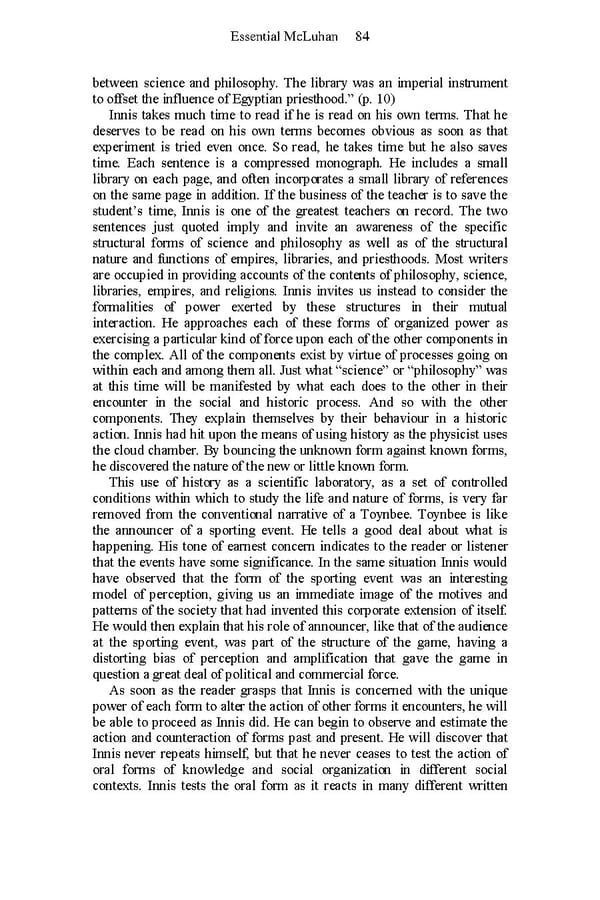Essential McLuhan 84 between science and philosophy. The library was an imperial instrument to offset the influence of Egyptian priesthood.” (p. 10) Innis takes much time to read if he is read on his own terms. That he deserves to be read on his own terms becomes obvious as soon as that experiment is tried even once. So read, he takes time but he also saves time. Each sentence is a compressed monograph. He includes a small library on each page, and often incorporates a small library of references on the same page in addition. If the business of the teacher is to save the student’s time, Innis is one of the greatest teachers on record. The two sentences just quoted imply and invite an awareness of the specific structural forms of science and philosophy as well as of the structural nature and functions of empires, libraries, and priesthoods. Most writers are occupied in providing accounts of the contents of philosophy, science, libraries, empires, and religions. Innis invites us instead to consider the formalities of power exerted by these structures in their mutual interaction. He approaches each of these forms of organized power as exercising a particular kind of force upon each of the other components in the complex. All of the components exist by virtue of processes going on within each and among them all. Just what “science” or “philosophy” was at this time will be manifested by what each does to the other in their encounter in the social and historic process. And so with the other components. They explain themselves by their behaviour in a historic action. Innis had hit upon the means of using history as the physicist uses the cloud chamber. By bouncing the unknown form against known forms, he discovered the nature of the new or little known form. This use of history as a scientific laboratory, as a set of controlled conditions within which to study the life and nature of forms, is very far removed from the conventional narrative of a Toynbee. Toynbee is like the announcer of a sporting event. He tells a good deal about what is happening. His tone of earnest concern indicates to the reader or listener that the events have some significance. In the same situation Innis would have observed that the form of the sporting event was an interesting model of perception, giving us an immediate image of the motives and patterns of the society that had invented this corporate extension of itself. He would then explain that his role of announcer, like that of the audience at the sporting event, was part of the structure of the game, having a distorting bias of perception and amplification that gave the game in question a great deal of political and commercial force. As soon as the reader grasps that Innis is concerned with the unique power of each form to alter the action of other forms it encounters, he will be able to proceed as Innis did. He can begin to observe and estimate the action and counteraction of forms past and present. He will discover that Innis never repeats himself, but that he never ceases to test the action of oral forms of knowledge and social organization in different social contexts. Innis tests the oral form as it reacts in many different written
 Essential McLuhan Page 90 Page 92
Essential McLuhan Page 90 Page 92